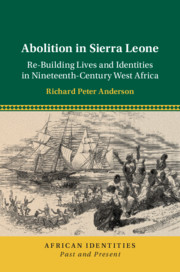Book contents
- Abolition in Sierra Leone
- African Identities: Past and Present
- Abolition in Sierra Leone
- Copyright page
- Dedication
- Contents
- Illustrations
- Acknowledgments
- Notes on the Text
- Abbreviations
- Introduction
- 1 Liberated African Origins and the Nineteenth-Century Slave Trade
- 2 Their Own Middle Passage
- 3 “Particulars of disposal”
- 4 Liberated African Nations
- 5 Kings and Companies
- 6 Religion, Return, and the Making of the Aku
- 7 The Cobolo War
- Conclusion
- Appendices
- Select Bibliography
- Index
Conclusion
Retention or Renaissance? Krio Descendants and Ethnic Identity
Published online by Cambridge University Press: 09 January 2020
- Abolition in Sierra Leone
- African Identities: Past and Present
- Abolition in Sierra Leone
- Copyright page
- Dedication
- Contents
- Illustrations
- Acknowledgments
- Notes on the Text
- Abbreviations
- Introduction
- 1 Liberated African Origins and the Nineteenth-Century Slave Trade
- 2 Their Own Middle Passage
- 3 “Particulars of disposal”
- 4 Liberated African Nations
- 5 Kings and Companies
- 6 Religion, Return, and the Making of the Aku
- 7 The Cobolo War
- Conclusion
- Appendices
- Select Bibliography
- Index
Summary
The conclusion moves chronologically forward, exploring the connections that the colony-born offspring of Liberated Africans felt toward their parents’ societies of birth, their forms of communal association, and their cultural and religious practices. While the emphasis of the study is on the charter generation who experienced the Middle Passage, themes such as community and identity do not lend them well to concrete end dates. The conclusion argues not only that certain customs and forms of communal identification “survived” the westernizing and Christianizing influences of colonial life, but that the late nineteenth century saw a resurgence or revival of such customs and associations. At a time when disillusionment with the British colonial project was at its height, the second- and third-generation offspring of those who came to Freetown on slave ships looked once again to the languages, dress, and community organizations of their forebears. This Conclusion argues that processes of ethnogenesis and creolization cannot simply be seen as a linear process in which certain vestiges can be traced across generations to certain regions of the African continent.
Keywords
- Type
- Chapter
- Information
- Abolition in Sierra LeoneRe-Building Lives and Identities in Nineteenth-Century West Africa, pp. 260 - 266Publisher: Cambridge University PressPrint publication year: 2020

